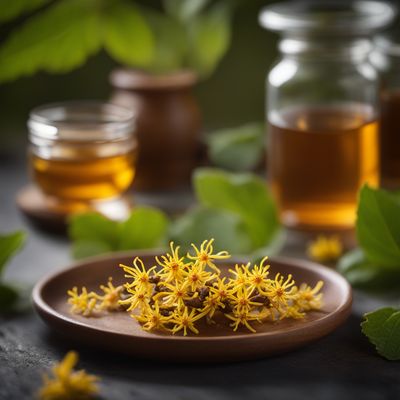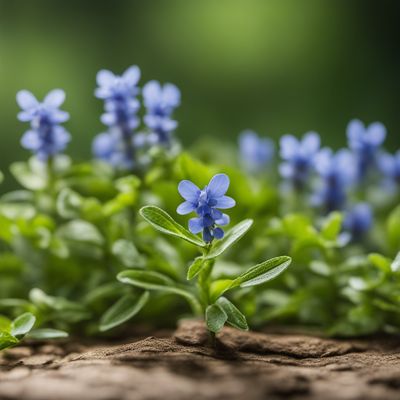
Ingredient
Damiana infusion leaves
The Elixir of Love: Damiana Infusion Leaves
Damiana infusion leaves are small, dried leaves that come from the damiana plant, scientifically known as Turnera diffusa. They have a delicate aroma and a slightly bitter taste, with hints of citrus and floral notes. These leaves are often used to make herbal infusions, which are believed to have aphrodisiac properties and provide a calming effect.
Origins and history
Damiana infusion leaves have a rich history dating back to the ancient Mayan civilization, where they were used as a traditional remedy for various ailments. Native to Central and South America, these leaves were highly regarded for their medicinal properties and were often used as an aphrodisiac. Today, damiana infusion leaves are still popular in traditional medicine and are also enjoyed as a soothing herbal tea.
Nutritional information
Damiana infusion leaves are low in calories and are a good source of antioxidants, vitamins, and minerals. They are particularly rich in flavonoids, which have been associated with various health benefits.
Allergens
There are no known allergens associated with damiana infusion leaves.
How to select
When selecting damiana infusion leaves, look for high-quality, organic leaves that are free from any signs of moisture or mold. Opt for leaves that have a vibrant green color and a fragrant aroma. Avoid leaves that appear dull or discolored.
Storage recommendations
To maintain the freshness and quality of damiana infusion leaves, store them in an airtight container in a cool, dry place away from direct sunlight. Properly stored leaves can retain their flavor and aroma for up to a year.
How to produce
Damiana plants can be grown in warm climates with well-drained soil. They require full sun exposure and regular watering. It is recommended to start with young plants or propagate them from cuttings.
Preparation tips
To prepare a damiana infusion, steep 1-2 teaspoons of dried leaves in a cup of hot water for 5-10 minutes. You can also combine damiana leaves with other herbs to create unique herbal blends. Damiana infusion leaves can also be used in baking or added to cocktails for a subtle herbal flavor.
Culinary uses
Damiana infusion leaves are commonly used to make herbal teas, tinctures, and extracts. They can also be incorporated into baked goods, such as cookies or cakes, to add a unique herbal twist. Additionally, damiana infusion leaves can be used to infuse spirits and create herbal cocktails.
Availability
Damiana infusion leaves are commonly available in Central and South America, where they are native. They can also be found in specialty health food stores or online retailers that offer herbal ingredients.
More ingredients from this category » Browse all

Smooth rupturewort infusion leaves
The Tranquil Herbal Elixir

Sweet blackberry infusion leaves
The Berry's Aromatic Brew

Shepherd’s purse infusion leaves
The Herbal Elixir of the Pastures

Bearberry infusion leaves
The Healing Power of Bearberry

St. John´s Wort infusion leaves
"Nature's Sunshine: Exploring the Healing Powers of St. John's Wort Infusion Leaves"

Holy thistle infusion leaves
The Healing Power of Holy Thistle

Witch hazel infusion leaves
The Natural Elixir: Unveiling the Power of Witch Hazel Infusion Leaves

Hearts ease infusion leaves
The Soothing Elixir of Hearts Ease

Raspberry (red and yellow) infusion leaves
The Fragrant Tea Leaves

Blackberry infusion leaves
The Essence of Blackberry Infusion Leaves

Sweet trefoil infusion leaves
The Delicate Herbal Elixir

Echinacea infusion leaves
The Healing Power of Echinacea